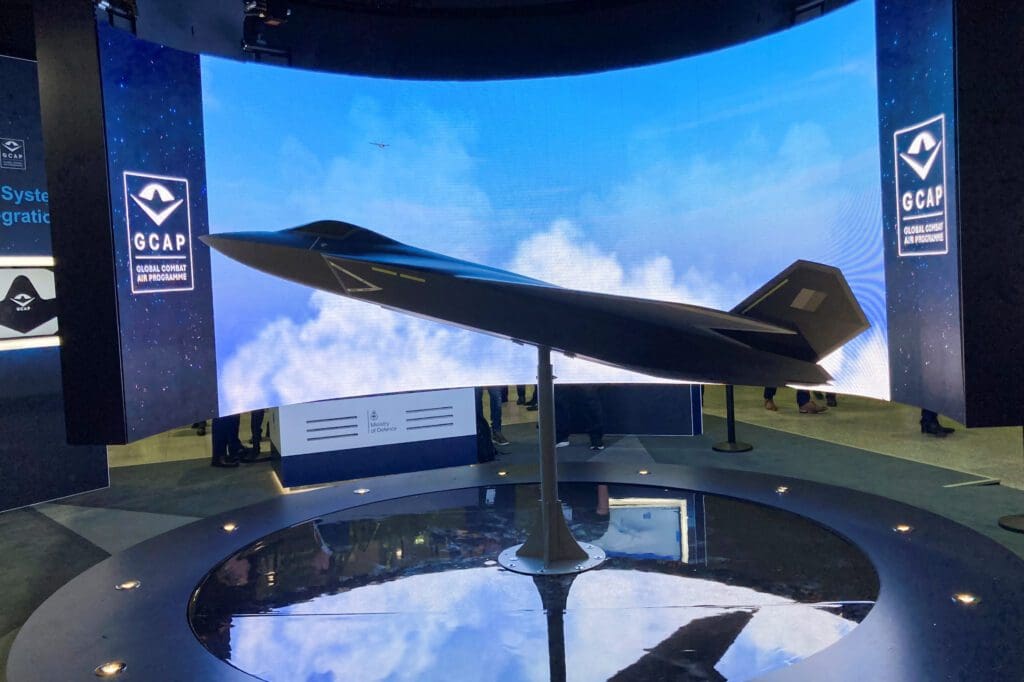Saudi Arabia has been intensifying its diplomatic efforts to join the Global Combat Air Programme (GCAP), a joint effort by Japan, the United Kingdom and Italy to build a next-generation combat jet. When Japanese Prime Minister Fumio Kishida visited Saudi Arabia in July, Crown Prince Mohammed bin Salman directly asked to join the alliance. But while the UK and Italy are open to Saudi Arabia’s offer, Japan is “firmly opposed,” according to a report by the Financial Times.
The project, announced in December 2022, integrates two next-generation fighter jet development projects—Japan’s Mitsubishi F-X and British-led Team Tempest—to share development costs. Japan and the UK have been cooperating on developing engine technology since 2021. Saudi Arabia has yet to undertake such a project, and is trying to join the GCAP as a step toward developing its own arms industry.
Japan’s decision last year to jointly produce fighter jets with the UK and Italy was a major turning point in its defense policy, which has long been solely dependent on U.S. or domestically made weapons. Working with Saudi Arabia would be another major shift—but also a rare, golden opportunity for Japan to increase its global influence and win new markets.
Japanese Hesitation
The Financial Times cited two reasons for Japan’s opposition to Saudi involvement in the GCAP: firstly, that it would complicate discussions on which countries Japan can sell its arms to, and secondly that it could delay the delivery of the fighters.
The first reason seems slightly misleading. Of course, participating nations may have different customers in mind when looking to sell the new fighter jets, and in theory, each could exercise a veto over sales to a particular country. But perhaps that was not the case Japanese officials were trying to make. They may have meant that Tokyo does not yet consider Saudi Arabia a close enough ally to buy next-generation fighter jets from Japan, which only lifted its post-war ban on arms exports in 2014. The UK and Italy, which have both exported extensive arms to Saudi Arabia despite domestic controversy over how those arms are used in places like Yemen, do not share such concerns. But given recent moves to deepen the relationship between Saudi Arabia and Japan’s rival China, Tokyo has yet to decide whether Riyadh is a trustworthy partner. Japan, for its part, is most likely to export the jets to Southeast Asian countries and India, and had not considered Saudi Arabia, at least initially, as a destination.
The second reason is also understandable. Saudi Arabia, which aims to localize 50 percent of defense procurement by 2030, would certainly demand that many parts of the production take place in Saudi Arabia. That could create delays, since Japan, the UK and Italy would have to help set up the Gulf country’s nascent defense sector. Japan plans to use the resulting fighter jets as the successor to the Japanese-American Mitsubishi F-2, which is set to be retired in 2035, so it cannot afford any delays.
Arms, Economics and Influence
These concerns notwithstanding, the inclusion of Saudi Arabia in the GCAP alliance could greatly advance Japan’s national interests and international influence. Japan’s traditionally strong ties with Saudi Arabia have mainly been economic. If it were to build a “special relationship” with Saudi Arabia through the development of a next-generation fighter jet, this would further bolster its relationship with the kingdom, its largest energy supplier and an increasingly assertive regional power.
Secondly, it would strengthen Japan’s position internationally. Japan has refrained from exporting arms since World War II, which has limited its ability to influence arms importers. It is true that many such countries, including Saudi Arabia, have recently diversified their arms sources, limiting such leverage. Yet arms exports remain useful tools when trying to influence a country’s policies. Saudi Arabia, with one of the largest military budgets in the world, would also be certain to buy many of the GCAP jets if it joined the alliance, as well as helping secure markets among its allies across the region. Saudi Arabia is now a major actor in the Global South and is set to join the BRICS bloc next year. This makes it more important than ever to keep it within the broader alliance led by Japan and Western countries.
Third, Saudi involvement could also help keep China and Russia from selling fighter jets to the kingdom. Although Saudi Arabia has recently been strengthening its economic ties with China, most of its military weapons are made in the U.S., the UK, and other European countries. This is one reason why Saudi Arabia has now turned its attention to GCAP, which includes the UK and Italy. Japan could leverage Saudi Arabia’s involvement to transform itself from a negligible actor in the arms export market to a major one, representing a significant opportunity. Japanese governments have long banned arms exports, as many in Japan believe that military expansion would lead to another World War II-like tragedy. However, due to the rise of China and growing calls domestically for Japan to become a “normal country” capable of exporting arms, the Japanese government lifted the ban in 2014, though it continues to impose strict criteria, limiting the weapons that can be exported and the countries that can receive them. If Saudi Arabia were added to the GCAP alliance, Japanese-made weapons would be used in Saudi Arabia, one of the world’s largest arms markets, and Japan could rapidly catch up with other arms exporters.
The entry of Saudi Arabia also entails risks. Japanese defense planners expect to take delivery of the new fighter jets by 2035, and are keen to avoid delaying the schedule. Reuters has reported that the existing members of the program had agreed a cost-sharing protocol in March, but if Saudi Arabia were to join the program, that discussion would have to start from scratch. In addition, Saudi Arabia is cooperating with China in many areas including military drones, ballistic missiles, and 5G telecommunications, but secrets related to the new jets must be strictly secured by the alliance members. Furthermore, Japanese public opinion could be hostile to the inclusion of Saudi Arabia, particularly given its record of military operations in Yemen. This means the kingdom will need to maintain its current diplomatic efforts to ease tensions with its neighbors.
British Unease
Japan also needs to keep in mind that its continued opposition to the inclusion of Saudi Arabia in the GCAP could worsen its relationship not only with Saudi Arabia but also with the UK. Saudi Arabia has been an important customer of the UK defense industry for a long time, and the UK wants to secure its future market share. According to SIPRI data, Saudi Arabia was the largest recipient of UK arms from 2013 to 2022, accounting for 32% of all exports. If the Saudis were to condition future such imports on its own inclusion in the GCAP, the UK would not look kindly on Japanese opposition. In addition, the UK almost certainly expects a financial contribution from Saudi Arabia to the project, which could even be more attractive than the technical and financial contribution from Japan. The project is very likely to be on the agenda when Crown Prince Mohammed makes an official visit to the UK later this year.
Japan needs to reconsider its opposition to Saudi Arabia’s participation in the GCAP in order to increase its own international influence, secure new arms markets and keep its allies happy, particularly the UK. Excluding Saudi Arabia, a key actor in the Middle East and the Global South more generally, could push Riyadh closer to China and Russia. However, challenges such as adherence to delivery schedules and protection of defense secrets must be carefully addressed to make the partnership successful.
The opinions expressed in this article are those of the authors and do not necessarily reflect the views of the Middle East Council on Global Affairs.


